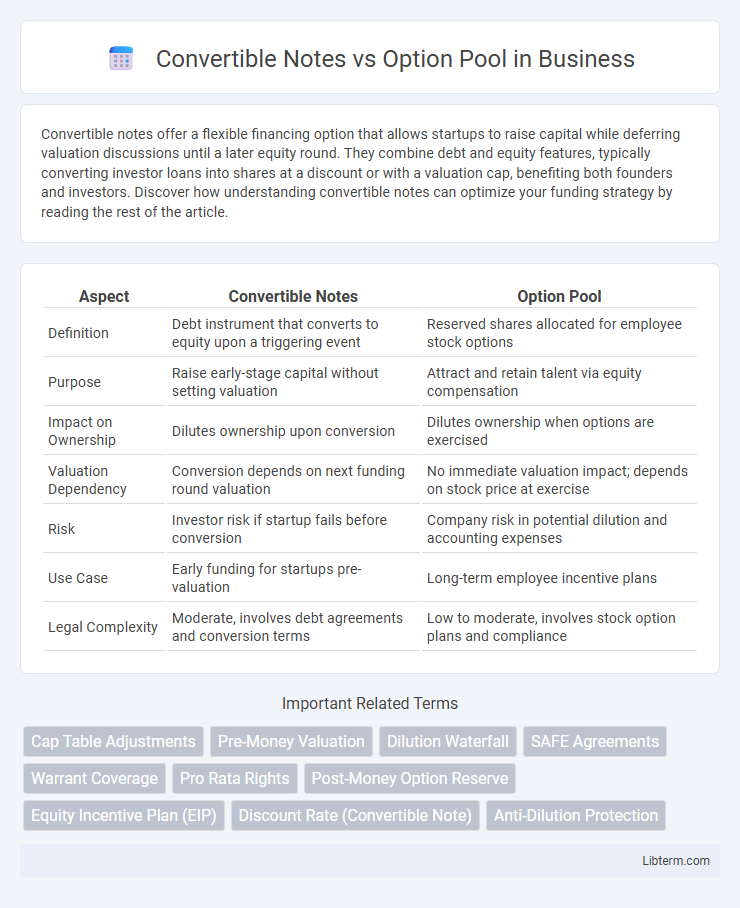Convertible notes offer a flexible financing option that allows startups to raise capital while deferring valuation discussions until a later equity round. They combine debt and equity features, typically converting investor loans into shares at a discount or with a valuation cap, benefiting both founders and investors. Discover how understanding convertible notes can optimize your funding strategy by reading the rest of the article.
Table of Comparison
| Aspect | Convertible Notes | Option Pool |
|---|---|---|
| Definition | Debt instrument that converts to equity upon a triggering event | Reserved shares allocated for employee stock options |
| Purpose | Raise early-stage capital without setting valuation | Attract and retain talent via equity compensation |
| Impact on Ownership | Dilutes ownership upon conversion | Dilutes ownership when options are exercised |
| Valuation Dependency | Conversion depends on next funding round valuation | No immediate valuation impact; depends on stock price at exercise |
| Risk | Investor risk if startup fails before conversion | Company risk in potential dilution and accounting expenses |
| Use Case | Early funding for startups pre-valuation | Long-term employee incentive plans |
| Legal Complexity | Moderate, involves debt agreements and conversion terms | Low to moderate, involves stock option plans and compliance |
Introduction to Convertible Notes and Option Pools
Convertible notes serve as a form of short-term debt that converts into equity, typically during a future financing round, offering startups a flexible way to raise capital without immediate valuation. Option pools allocate a percentage of a company's shares for future employee stock options, incentivizing talent by providing ownership potential. Understanding the mechanics of convertible notes and option pools is essential for structuring startup funding and equity distribution effectively.
Key Definitions: Convertible Notes vs Option Pool
Convertible notes are short-term debt instruments that convert into equity, typically during a future financing round, allowing investors to convert their investment into shares at a discounted price or with a valuation cap. An option pool is a reserved percentage of a company's equity set aside to grant stock options to employees, advisors, and consultants, incentivizing and retaining talent. Understanding the distinction helps startups manage funding strategies and equity dilution effectively.
How Convertible Notes Work in Startup Financing
Convertible notes function as short-term debt instruments that convert into equity during a future financing round, allowing startups to raise capital without immediate valuation. Investors loan money with the agreement that their investment will convert into shares, typically at a discount or with a valuation cap, providing protection against overvaluation. This mechanism aligns investor and company interests by delaying equity valuation until the startup achieves key milestones or secures additional funding.
The Role of Option Pools in Equity Compensation
Option pools play a critical role in equity compensation by reserving a percentage of a company's shares to attract and retain key employees, advisors, and consultants. Unlike convertible notes, which are debt instruments that convert to equity upon a future financing event, option pools provide direct ownership incentives, aligning employee interests with company growth. Carefully structuring the option pool size impacts startup valuation and dilution, influencing both investor negotiations and employee motivation.
Convertible Notes: Pros and Cons for Startups
Convertible notes provide startups with quick access to capital without immediately diluting equity, offering flexibility in valuation and fundraising timing. However, the accumulation of debt and potential conversion terms can lead to unexpected dilution or complex negotiations with investors. Startups must carefully balance the benefits of deferred valuation clarity against the risks of investor control and conversion price uncertainty inherent in convertible notes.
Option Pools: Advantages and Drawbacks for Founders
Option pools provide a structured way for startups to allocate equity to key employees, attracting talent without immediate cash expenses. Founders benefit from preserving control while incentivizing growth but face dilution risks as option pools increase the total shares outstanding. Careful planning is required to balance motivational incentives against the impact on founders' ownership percentages and future fundraising rounds.
Impact on Valuation: Convertible Notes vs Option Pool
Convertible notes postpone valuation by converting debt into equity during a future funding round, often at a discount or valuation cap, which can lead to dilution later but prevents immediate valuation conflicts. Option pools create immediate dilution as shares are reserved upfront for employee incentives, impacting pre-money valuation by reducing the founder's ownership percentage. Investors often require larger option pools pre-financing, effectively lowering the valuation attributable to founders and early shareholders.
Investor Perspective: Preferences and Considerations
Investors often prefer convertible notes for their simplicity, debt-like structure, and ability to delay valuation until a qualified financing round, providing downside protection and potential equity upside. Option pools can dilute investor ownership, making them a critical consideration in pre-money valuations and negotiating terms to protect investment value. The choice between convertible notes and option pools depends on the investor's risk tolerance, desired control, and timing of equity conversion.
Founders’ Strategies for Balancing Convertible Notes and Option Pools
Founders strategize by carefully balancing convertible notes and option pools to optimize equity dilution and maintain founder control during early fundraising. Implementing a convertible note with a valuation cap allows deferral of precise valuation while establishing an option pool sized between 10-20% ensures adequate incentives for early employees. Prioritizing the timing of option pool creation either pre- or post-money converts notes purposefully to minimize dilution impact and align with long-term growth objectives.
Conclusion: Choosing the Right Tool for Startup Growth
Convertible notes provide startups with a flexible, debt-based financing option that delays valuation until a future equity round, preserving founder equity early on. An option pool incentivizes key employees by granting equity stakes, aligning team interests with long-term company growth, but requires careful size management to avoid excessive dilution. Selecting between convertible notes and option pools depends on balancing immediate capital needs with talent retention strategies to optimize startup growth trajectories.
Convertible Notes Infographic

 libterm.com
libterm.com